 Petzlover
PetzloverLagotto Romagnolo is originated from Italy but Pugnaces Britanniae is originated from United Kingdom. Lagotto Romagnolo may grow 27 cm / 10 inches shorter than Pugnaces Britanniae. Lagotto Romagnolo may weigh 94 kg / 207 pounds lesser than Pugnaces Britanniae. Both Lagotto Romagnolo and Pugnaces Britanniae has almost same life span. Lagotto Romagnolo may have less litter size than Pugnaces Britanniae. Lagotto Romagnolo requires Moderate Maintenance. But Pugnaces Britanniae requires Low Maintenance
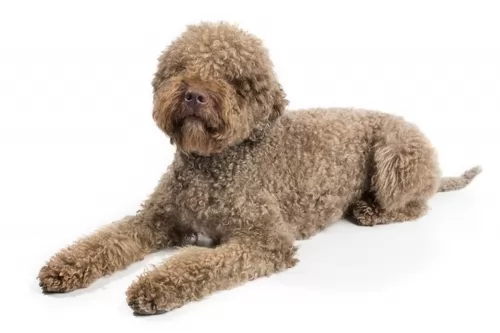 The Lagotto Romagnolo dog, known as the Water Dog of Romagna, and falling into the sporting dog category, is a pure breed dog which comes from the Romagna region of Italy.
The Lagotto Romagnolo dog, known as the Water Dog of Romagna, and falling into the sporting dog category, is a pure breed dog which comes from the Romagna region of Italy.
The dog’s role was that of gun dog and to retrieve water birds. Today he is more used as a truffle hunter in Italy as well as being used for a therapy dog.
In 2015 the Lagotto Romagnolo was accepted by the American Kennel Club into the sporting dog category.
Pugnaces Britanniae is a dog which is now extinct. There isn't certainty surrounding the origins of the dog but it is thought they descended from dogs brought to Britain way back in the 6th century BC already.
These are ancient dogs, and when you do research you find references dating back to centuries ago. In fact when you read of the Roman conquest of Britain you read of huge dogs, which the Romans referred to as Pugnaces Britanniae.
It is believed that the English Mastiff descended from the ancient Alaunt and Pugnaces Britanniae and that the dog was used as a war dog.
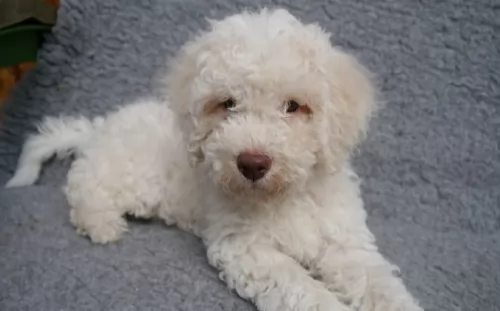 The Lagotto Ramagnolo is a medium sized dog where both males and females stand anything between 41 and 48cm and weigh 11 to 16kg.
The Lagotto Ramagnolo is a medium sized dog where both males and females stand anything between 41 and 48cm and weigh 11 to 16kg.
He is well proportioned and muscled, he has large yellow or brown eyes with a black or brown/pinkish nose, floppy, rounded ears and a tail which is left long these days.
The Lagotto Romagnolo has a waterproof double coat with a woolly texture and which hardly sheds, putting him as being hypoallergenic.
The coat can be in a number of different colors such as cream, grey, white, apricot, brown or tan. The face of the dog has a bit of a beard as well as noticeable bushy eyebrows.
Because the Lagotto is a sporting breed, he has had to call on all his senses to retrieve water birds. Good eyesight, sharp listening skills and an excellent sense of smell makes him the ideal gun dog but he also makes a loyal family pet.
He makes a good playmate for children and he happily gets on well with other pets in the home. Being an intelligent dog, he is easy to train too.
The sporting past of his has made it that he isn’t a couch-potato type of dog and he will require mental- and physical stimulation. His role as gun dog meant that he was required to retrieve birds in water, and he is an excellent swimmer and will happily plunge into water to join you in a swim.
Have him trained and socialized and you’ll find him tuned in to obeying your commands. Because of his smallish size, the Lagotto can adjust well to life in the city or in the countryside, just so long as he still receives his full quota of exercise.
The Pugnaces Britanniae was a huge dog standing at roughly 67 to 75cm and weighing 52 to 110kg.
He was a heavily built dog, a Mastiff type dog that had a large head, broad muzzle with fairly loose skin around the mouth, brown eyes, a broad back and rump, muscular legs and floppy ears with a long tail. In fact the Mastiff, thought to have descended from the ancient Alaunt and Pugnaces Britanniae, gives you an idea of what the dog looked like. He no doubt has a short, smooth coat available in fawn, tan or brindle and with the black mask.
The Pugnaces Britannia was a naturally aggressive dog so it is to be expected that he wouldn’t automatically have been a good family dog, possibly being aggressive around children and other dogs. They were intelligent and were no doubt taught some simple commands.
They were also very territorial dogs, wanting to instinctively chase and attack unknown people and animals. They were strong minded, confident, loyal ad loving dogs towards their owners, being protective of them, wanting to please them.
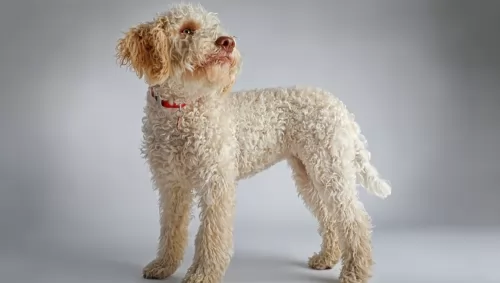 Many dog lovers appreciate that the Lagotto Romagnolos is looked upon as an allergy-friendly dog with his non-shedding coat.
Many dog lovers appreciate that the Lagotto Romagnolos is looked upon as an allergy-friendly dog with his non-shedding coat.
Being a medium sized dog, he is manageable too. Add to that excellent characteristics such as being amicable, friendly and loving. Training him some important, basic commands won’t be difficult either and you can add in intelligence to his list of good qualities.
As loving dogs, they are dedicated to their families, getting on well with children in the home as well as with other pets. He is a social dog and just longs to be a treasured member of the family like anybody else.
Count him in with all your activities and you’re going to have a one-in-a-million undemanding and contented canine friend.
The Pugnaces Britanniae may well have been a large dog and quite imposing to look at but he was in all likelihood a good-natured pet who got on well with his family members, being loyal and loving if brought up correctly.
Long ago dog training and socialization didn’t exist but a large dog like this would have to be socialized and trained to become obedient and an amicable all-rounder.
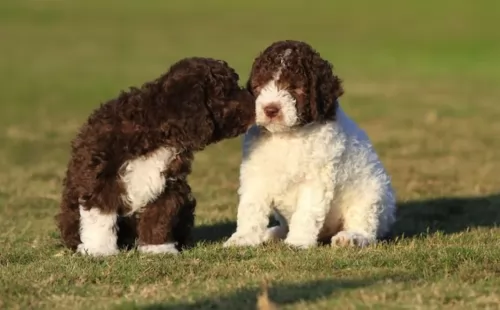 Lagotto live roughly 16 years with the best food, exercise and loving environment. Some health issues may well crop up, though unlikely, but it is good to be aware of them.
Lagotto live roughly 16 years with the best food, exercise and loving environment. Some health issues may well crop up, though unlikely, but it is good to be aware of them.
You hear the words ‘Hip dysplasia’ being bandied about a lot in the world of dogs because it is such a common dog ailment. Your dog can’t be cured but there are a range of management options that will ensure your pet remains as comfortable as possible.
It is such a common joint disease where the hips partially dislocate. Without veterinary intervention, it can be debilitating and painful. It is essentially a genetic condition but diet and environmental factors can come into play too.
You don’t want your pet putting on too much weight as this puts extra strain on the joints.
Your dog has loss of function because of the degeneration of cells or tissues. The illness affects different parts of the brain in dogs. You’ll notice a mild tremor of the head and uncoordinated movements. Your vet will want a history of your pet’s health as well as lab tests.
The Pugnaces Britanniae could live to 10, 11 or 12 years of age with good care. Large Mastiff type dogs like this would have had to watch out for common canine diseases such as hip dysplasia, cancer and bloat.
In those days, no screening tests were available for health problems like this. Gastric dilatation volvulus or bloat is a common health issue with large, deep chested dogs where the stomach fills with gas and the stomach twists. Its a life threatening disease.
Canine heart disease is another serious health issue with these mastiff type dogs. Early stages with heart disease show there may well be no symptoms at all. However, as the heart disease progresses towards congestive heart failure, the dog will have symptoms such as fatigue, difficulty with breathing, weight loss, a distended abdomen and coughing.
A dog with symptoms like this would have to see a vet immediately.
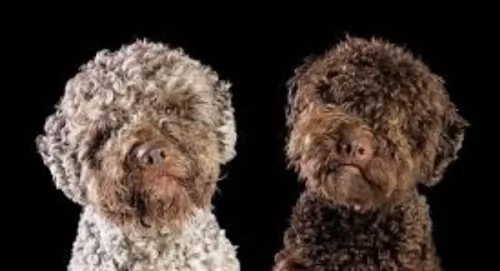 Not everyone agrees with how to take care of the Lagotto’s rough, waterproof coat of thick curls. The coat doesn’t shed much but it can pick up grass and small twigs easily. Unless brushed out at least 2 or 3 times a week, the coat can become matted and unruly. For many the coat needs to be trimmed regularly.
Not everyone agrees with how to take care of the Lagotto’s rough, waterproof coat of thick curls. The coat doesn’t shed much but it can pick up grass and small twigs easily. Unless brushed out at least 2 or 3 times a week, the coat can become matted and unruly. For many the coat needs to be trimmed regularly.
The Lagotto needs plenty of exercise. His hunting and retrieving past has given him a natural urge to retrieve and he loves going after every ball you throw him. He will also love to join you on your daily walks and it gives him the chance to sniff around. With swimming being added in, this dog is your true sporting buddy.
Make sure you feed your Lagotto the very best quality food there is to ensure his well-being and longevity. If you're unsure about whether he is getting in all the necessary vitamins and minerals with his food, speak to a dog expert as good food is key to a happy, healthy dog.
The diets of ancient dogs were different to what they are today, as in those days there were no commercially manufactured dog foods. Dog owners in all likelihood tossed scraps to them which included starch.
Today a large dog such as the extinct Pugnaces Britannia would have no doubt been fed a high quality kibble from a leading brand and packed with minerals and vitamins specially formulated for a large dog breed.
Homemade food is also important, but not any kind of food – it has to be food which doesn’t upset the dog’s digestive system. Simple but nutritious food such as boiled chicken, brown rice or pasta, sweet potatoes, carrots and spinach is ideal for a dog, and when it is chopped up can be added twice a week to the dry kibble for a tasty, healthy treat.
Raw meat added in occasionally is also hugely beneficial. No dog should ever be without fresh, cool water constantly available.
As a short haired dog, the Pugnaces Britanniae would have required a brushing twice a week to rid the dog of loose hairs. Maybe in those days they didn’t check their dogs over to see that all was well, but today you would need to check the inside of the ears. If the insides were red, it could be a sign of an ear infection brought on by dampness, excess wax and dirt.
The eyes would need to be checked for discharge and the teeth checked a well. One rotten tooth can cause a lot of havoc. The nails of the dog would have had to be checked and clipped as well.
As a war dog, the Pugnaces Britanniae would have been fit. He is a big dog and while they require exercise such as walks and hide-and-seek type of games, he isn’t the kind of dog that would go running with you on a jog, as large, heavy dogs can overheat easily.